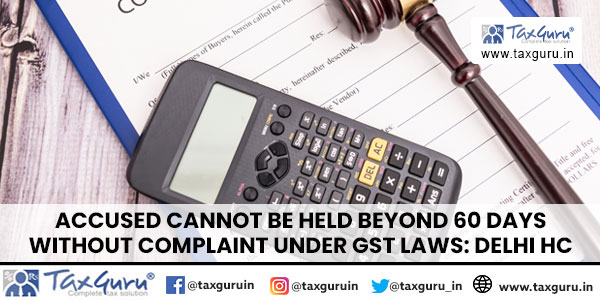Accused/Taxpayer cannot be kept in custody beyond the period of sixty days if complaint has not been filed pursuant to investigation for offences specified under GST Laws: Delhi HC
Summary : The Delhi High Court, in Commissioner of Central Tax, GST v. Adesh Jain (August 30, 2024), ruled that a taxpayer cannot be detained beyond 60 days if the prosecution has not filed a complaint following an investigation under GST laws. This judgment aligns with Section 167(2) of the CrPC (now Section 187(3) of Bharatiya Nagarik Suraksha Sanhita), which provides statutory bail to accused persons when investigations exceed prescribed time limits. The case involved the Commissioner of Central Tax challenging a Chief Metropolitan Magistrate’s (CMM) order granting bail to Adesh Jain, citing the department’s failure to file a complaint despite 60 days of custody. The High Court observed that Section 167(2) is a protective provision ensuring that individuals are not held indefinitely without charges. It noted that the prosecution had neither completed its investigation nor provided a valid reason for the delay, even after five years. The court emphasized that the right to statutory bail is recognized as a constitutional right by the Supreme Court and dismissed the writ petition for lack of merit. It also reiterated the importance of timely filing complaints, as directed in GST departmental guidelines.

Introduction: The Hon’ble Delhi High Court in the case of Commissioner of Central Tax, GST v. Adesh Jain [CRL. M.C. 2824 of 2019 dated August 30, 2024] dismissed the writ petition filed by the Department and held that, Accused/Taxpayer cannot be kept in custody beyond a period of more than sixty days when the complaint, pursuant to the investigation, relating to offences specified under GST Laws has not been filed. The said relief has been granted by invoking the powers under Section 167(2) of the Criminal Procedure Code, 1973 (“CrPC”) [Now Section 187(3) of Bharatiya Nagarik Suraksha Sanhita].
Facts:
Commissioner of Central Tax, GST (“the Petitioner”) has filed a writ petition challenging the order dated February 05, 2019 (“the Impugned Order”) passed by the Chief Metropolitan Magistrate (‘CMM’), Patiala House Courts, New Delhi, in Commissioner of Central Tax, GST Delhi (West) v. Adarsh Jain whereby, Adarsh Jain (“Accused/Respondent”) was released on bail.
The Impugned Order was passed on the ground that the investigation was not completed and the complaint was not filed by the petitioner department despite respondent having spent sixty days in custody. Therefore, the CMM granted bail to the Accused by invoking the powers of Section 167(2) of the CrPC.
Issue:
Whether the Accused/Taxpayer can be kept in custody beyond the period of sixty days if complaint has not been filed pursuant to investigation for offences specified under GST Laws?
Held:
The Hon’ble Delhi High Court in the case of CRL. M.C. 2824 of 2019 held as under:
- Observed that, Section 167(2)(a)(ii) of the CrPC is a beneficial provision granting relief to the accused where the investigating agency is not able to complete the investigation within a period of sixty or ninety days. It categorically provides that once the prosecuting agency is unable to complete the investigation within the time provided, the benefit cannot be denied to the accused. The right to apply for statutory bail under Section 167(2)(a)(ii) has been recognized by the Hon’ble Apex Court as a Constitutional right.
- Noted that, the complaint in the present case was not filed when the application under Section 167(2) of the CrPC was taken up for hearing and the Respondent/Accused had already spent sixty days in custody.
- Opined that, it is beyond understanding as to why the complaint has not been filed as five years have elapsed, and the bail in the present case is being strongly opposed, thus, the writ petition filed is devoid of merits.
- Held that, the writ petition is dismissed.
Relevant Provision:
Section 187(3) of Bharatiya Nagarik Suraksha Sanhita (Earlier Section 167(2) of the CrPC)
Section 187: Procedure when investigation cannot be completed in twenty-four hours
“(3) The Magistrate may authorise the detention of the accused person, beyond the period of fifteen days, if he is satisfied that adequate grounds exist for doing so, but no Magistrate shall authorise the detention of the accused person in custody under this sub-section for a total period exceeding-
(i) ninety days, where the investigation relates to an offence punishable with death, imprisonment for life or imprisonment for a term of ten years or more;
(ii) sixty days, where the investigation relates to any other offence, and, on the expiry of the said period of ninety days, or sixty days, as the case may be, the accused person shall be released on bail if he is prepared to and does furnish bail, and every person released on bail under this sub-section shall be deemed to be so released under the provisions of Chapter XXXV for the purposes of that Chapter.”
Our Comments:
As per Instruction No. 04/2022-23 [GST-Investigation], issued by the GST Investigation Wing, it has been prescribed that the Department should make all possible efforts to file the complaint within 60 days of the arrest, taking into consideration the aforesaid provision cited above. The relevant para has been reproduced herein for reference:
“7. Procedure for sanction of prosecution:
7.1 In cases of arrest(s) made under section 69 of the CGST Act, 2017:
7.1.1 Where during the course of investigation, arrest(s) have been made and no bail has been granted, all efforts should be made to file prosecution complaint in the Court within sixty (60) days of arrest. In all other cases of arrest, prosecution complaint should also be filed within a definite time frame.”
****
(Author can be reached at info@a2ztaxcorp.com)





